Technorati Tags: G8 and G-8 summit or St. Petersburg Russia and Vladimir Putin, or President Bush and Constantine Palace, or G8 Summit Declaration on Counter Terrorism, and PODCAST, or Global Energy Security, and Junior G8, or Junior 8,
 | President Bush and Russian President Putin Participate in Press Availability , MP3 for POCAST, International Media Center, Strelna, Russia 12:29 P.M. (Local) |
President Bush traveled to St. Petersburg, Russia to attend the G-8 Summit on July 15-17, 2006. The G-8 Summit includes Leaders from Canada, France, Germany, Italy, Japan, Russia, the United Kingdom, and the United States. The European Union also participates. As at previous G-8 Summits, the Leaders will discuss continued cooperation on a broad range of international economic, security, and political issues.
 | PRESIDENT PUTIN: (As translated.) Dear ladies and gentlemen, I have just completed my meeting with the President of the United States. The Russian party is satisfied with the results of this meeting. |
(Editors Note: Resources, and Documents follow text of Putin, Bush Press Availability Updated for duration of Summit)
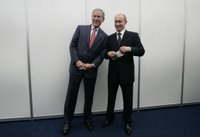 | We have adopted a joint statement, the basis of which are our parallel initiatives on the secure development of nuclear energy. Its main goal is to contribute to the |
 | It is equally important to pay a close attention to the development of innovative technology in the creation of new-generation reactors. |
 | In addition to that, we have come up with a joint statement on fighting acts of nuclear terrorism. It reaffirms the shared desire of Russia and the United States |
On the whole, we hope that our joint proposals and agreements will lay a good groundwork for a successful G8 summit. They will set the right constructive tone for the proceedings of a credible international forum.
We have also discussed bilateral cooperation in the light of the parallel instructions to the government agencies and departments of the two countries to step up our interaction. We
have registered success in the achievement in all areas -- economy, security, science and outer space, people-to-people contacts. Some of the instructions have already been fulfilled; others are still being carried out. New goals have been agreed upon that will be addressed in the near future. Those include the peaceful use of nuclear energy, fighting money laundering, fighting avian influenza, and cultural cooperation.
We have not limited ourselves to the discussion of the current problems. Quite the contrary. We have tried to glance at the Russian-U.S. relationship from the perspective of the future and in the broad context of the development of the system of international relations as a whole.
I would like to thank our American partners for a friendly and constructive atmosphere in which our meeting has taken place. Thank you for your attention.
PRESIDENT BUSH: We did have a very good discussion today. It was started -- actually, our discussion started last night over a really good dinner. And I want to thank you and Mrs. Putina for being such wonderful hosts.
You've got to admit this is a fantastic setting. It's beautiful. The cottages are very comfortable. I think that our fellow G8 leaders are going to really enjoy being here.
Anyway, we had a good discussion this morning. One thing is clear, is relations between America and Russia are good, and they're important that they be good. We've got a lot to -- we've got a lot to work on. We discussed North Korea and Iran. Those are two difficult issues, made less difficult because Russia and the United States are willing to work together to send clear messages to both governments that their nuclear weapons ambitions are not acceptable.
We talked about the Middle East. I explained my position, which I'm confident I'll be asked about here in a minute. The President talked about his concerns. We share the same concerns. We are concerned about the violence and we're troubled by the loss of innocent life. President Putin, like me, wants there to be peaceful dialogue. And so we had a good, frank discussion about the issue.
We talked about our bilateral relations. I think it's indicative of the strength of our relationship that we're able to agree on non-proliferation matters -- not only agree on it, we're taking the lead on this issue. And I want to thank the President for his leadership on this issue.
We're talking about nuclear cooperation, and we're about to begin dialogues about how we can cooperate better when it comes to peaceful uses of nuclear power. We're talking about counter-terrorism. Nation states face the threat of terrorism, and we want to work together to deal with this threat.
I, of course -- we talked philosophy. One thing, what happens when you get relaxed and are friendly with each other, you're able to share philosophies and able to ask questions about decision-making. And I appreciate very much our discussion last night and this morning about why the President has made decisions he's made, what decisions he intends to make, and the decisions I made. We don't always agree with each other, but nevertheless, it's important for leaders to be able to share philosophy, whether it be the philosophy of government or the philosophy of governing.
And our relationship is good. And I want to thank the President for his hospitality. I thank you for your good food, thank you for the 60th birthday gift you gave me last night, and thanks for the meeting this morning.
PRESIDENT PUTIN: Ladies and gentlemen, please ask your questions. There will be three questions on each side. We'll start with the Russian journalists.
Q Thank you. Good afternoon. My question is to both leaders. Question one is to President Bush. Russia, at the negotiations with its international partners, has demonstrated openness and transparency in its economy, but does not always receive an adequate response. We can see this at the talks on the accession of Russia to the WTO. Since 2001, the United States has been supportive of Russia's accession to the WTO, but why are you the key impediment for the completion of this process? I'm sure that you discussed this issue at the negotiations.
And my question to Mr. Putin: Given such difficulties, can we afford to give up a proactive position with respect to the accession to the WTO? Thank you.
PRESIDENT BUSH: We're tough negotiators. But -- and the reason why is because we want the agreement that we reach to be accepted by our United States Congress. In other words, when we negotiate an agreement, it has to be approved -- any trade agreement has to be approved. But I believe we're fair negotiators, and our negotiators come to the table trying to achieve the objective that I've sent out, that we want Russian accession into WTO. That's what we want. And we will continue negotiating.
Evidently, there was a false report in the press that said a deal was reached. Well, it's almost reached. In other words, we -- a lot of the areas, we found accommodation in a lot of the areas. But there's more work to be done. And we discussed this today and I assured the President that we'll continue to negotiate. And he assured me that we'll continue to negotiate in good faith to try to reach an agreement that has been difficult to achieve. I understand that.
But you've just got to understand the intention to achieve an agreement is there.
PRESIDENT PUTIN: I and my guest, my friend, the President of the United States, George W. Bush, are often asked the question, does our present relationship help in progressing -- in addressing this question in resolving various international issues? I know that he believes so, that this informal personal relationship is helping us in our work. I have to tell you that at the same time, it does not hamper us in standing up for our national interests in this or that area.
The WTO accession talks are very concrete, calculable in their nature, which can be expressed in terms of millions of dollars or rubles. This is a complicated process that has lasted for quite a while, for quite a few years. This difficulty is not a surprise to us. We will continue to work further, pursuing our interest, the interest of our developing economy.
Q The violence in the Middle East is escalating despite calls for restraint. What can you, President Bush and President Putin, do to stop the violence, stop the fighting, given that there is divisions among allies here about whether Israel is using excessive force?
PRESIDENT BUSH: I think you'll find all parties here want the violence to stop. In my judgment, the best way to stop the violence is to understand why the violence occurred in the first place. And that's because Hezbollah has been launching rocket attacks out of Lebanon into Israel, and because Hezbollah captured two Israeli soldiers. That's why we have violence.
And the best way to stop the violence is for Hezbollah to lay down its arms, and to stop attacking. And, therefore, I call upon Syria to exert influence over Hezbollah.
Now, here's my concern -- is that we were making good progress toward a two-state solution in the Middle East. The Israeli Prime Minister came to Washington and talked to me about his desire for there to be a democracy living side-by-side with another democracy, said this was part of his strategic vision for Israel and for peace.
And he was working toward that end. As you know, he made efforts to reach out to President Abbas, who we support. He made efforts to reach out to countries in the neighborhood to help achieve this vision. And as the vision was progressing, certain elements -- certain terrorist elements began to act to stop the advance of democracy. The militant wing of Hamas made decisions to attack and to capture. Hezbollah has made decisions to stop the advance of a two-state solution.
The solution, short-term solution is for Hezbollah to stop the attacks. The longer-term solution is for nations around the world and nations in the neighborhood to support those who support the advance of democracy.
PRESIDENT PUTIN: I agree with the premise that it is absolutely unacceptable to try and reach this or that goal, including political goals, through the use of force, through abductions, through carrying out strikes against an independent state from the territory of another state. This is all true. And in this context we consider Israel's concerns to be justified.
At the same time, we work under the assumption that the use of force should be balanced. And, in any case, bloodshed should stop as soon as possible. This should be the point of departure for the efforts to create an enabling environment for the resolution of the entire set of problems. Escalation of violence, in our opinion, will not yield positive results.
At any rate, we share the approach with President Bush. We will take every necessary effort on both sides, and I hope that our G8 colleagues will support us. We will find common ground on this front in order to bring the situation, as soon as possible, to a position where concrete results could be achieved, not only in terms of the cessation of combat, but also in terms of building an enabling environment for the development of Israel within secure borders, in the context of security, as well as in terms of the building of the independent Palestine state.
Q Mr. President, let me address my question to both of you. There has been a lot of concerns about proliferation of weapons of mass destruction. And having discussed this issue, could you share the results of your talks? And also, if you could let me, we all can see that you enjoy good personal relationships, but do you notice any deterioration of ties on a state level between the two countries? Thank you.
PRESIDENT BUSH: What was the first part of the question?
Q Have you discussed proliferation of weapons of mass destruction and missile delivery, and what are the results of your talks?
PRESIDENT BUSH: We sure have. We talked about our concerns about Iran developing a nuclear weapon, or Iran having the capacity to make a nuclear weapon, and we talked about North Korea. And the results of our talks are that we agree that we've got to work together to send a common message to both that there is a better way forward for these leaders.
And so we're working with Russia and our partners to develop Security Council resolutions that will send a clear message. One thing is for certain, that if the Iranians see that the United States and Russia are working together on this issue, they'll understand the seriousness of our intent.
And so we spent time talking about the issue, sure did. We understand that a grave threat that faces countries like America and Russia would be -- is the ability of a terrorist organization to end up with a weapon of mass destruction. Both nations have had to deal with terrorism; both nations know what it's like to see people blown up. Russia suffered through one of the most horrible terrorist incidents in modern mankind, which is Beslan, where terrorists are willing to kill young children to achieve political objectives. And the President and I understand that when you make that kind of attitude with a weapon of mass destruction you could be talking about greater catastrophe. And so we spent a lot of time talking about it.
I think relations between the United States and Russia are very good. There's a lot of skeptics on both sides of the equation as to whether or not the relationship is good. We've got people in Russia questioning U.S. motives, people in America questioning Russian motives. But that's what happens when you have -- when you're big nations that have got influence, where you've got leaders willing to make tough decisions. And I would characterize, from my perspective, that our relationship is strong and necessary. That's the point I want to make to you -- that a strong relationship will make the world a better place, in my judgment, because we'll be better able to confront the current problems that face us all.
PRESIDENT PUTIN: I have already mentioned that we will not participate in any crusades, in any holy alliances. This is true. I reaffirm our position in this matter. But our common goal is to make the world a more secure place, and certainly we'll be working with all our partners, including the United States, in order to address this problem. It is for this reason that we are joining our efforts with other G8 countries.
And I have to say that this is not some kind of plot against a particular country, where a certain problem emerges, be it missile or nuclear proliferation. We are seeking not only for the possibility of controlling this or that process; we are seeking opportunities for ensuring their legal access to nuclear technology. It is to this end that we have adopted our joint initiative on the creation of international centers for uranium enrichment and reprocessing of spent nuclear fuel. These are not unilateral actions aimed at trying to block somebody's access to something. This is a search for solutions that could ensure development in the world, at the same time would make the development secure in terms of nuclear nonproliferation and missile nonproliferation.
We're satisfied with the level of exchanges at the working level, which we have achieved in terms of bilateral cooperation. At the summit's end, in the context of the U.N. Security Council, we will continue our work tonight and tomorrow in the course of our discussion with our partners who are arriving in St. Petersburg.
Q Mr. President, we know that you talked about Iran and North Korea. Let me ask you if you moved forward at all on these issues? Did you ask Russia to take specific steps, for example with Iran to agree to U.N. sanctions? Did you discuss what you could move on in North Korea to move it forward?
And, President Putin, is Russia now willing, if necessary, to vote for sanctions in the United Nations to stop Iran's nuclear preparations?
PRESIDENT BUSH: We strategized on both issues. But this isn't the first time that we've talked together to -- on how to solve problems. You might remember that Russia proposed a very interesting way forward for Iran. It was the Putin government that said to the Iranians, if you want a civilian nuclear power program, we will support you in that; however, we will provide the fuel and we'll collect the spent fuel. I thought it was a very innovative approach to solving the problem. I strongly supported the initiatives.
So, Bill, to answer your question, this isn't the first time that we have strategized on how to solve this problem. And, yes, we talked about the U.N. Security Council resolution. And, no, I'm not going to tell you the particulars about the conversation. I will tell you, however, that there is common agreement that we need to get something done at the U.N. And I'm confident we will be able to do that. And there's agreement that we need to get something done on North Korea at the United Nations.
Here's the thing, though, just so that everybody understands: Diplomacy is not two countries just saying, this is the way it is. Diplomacy is two countries agreeing to work together with other countries, in this case, to come up with common language that we can live with that sends the same message, and that is, no nuclear weapons programs.
Our goal and objective is to have a nuclear-free -- nuclear weapons-free Korean Peninsula. Russia shares that objective. China shares the objective, Japan shares the objective, and South Korea shares the objective. So we've got common ground to move forward, and now we're working on language. And it was a very constructive meeting.
PRESIDENT PUTIN: You know, I have spoken on this account many times. I can repeat, it is not in Russia's national interest to see a proliferation of weapons of mass destruction, including nuclear weapons, especially in such an explosive region as the Middle East.
This is something that we tell our Iranian partners directly. We have always told them about it. There is nothing novel or new about our position in this respect. But we work on the assumption that we have to find efficient ways of ensuring security around the world. We need to take efficient diplomatic steps that would not disrupt the gentle fabric of the negotiations in the search for mutually acceptable decisions. And we're satisfied with the status of the U.S.-Russia relationship in this area.
Q I apologize, but I would like to follow up on the question of my U.S. colleague. Could you speak at greater detail? You have discussed the Iranian nuclear issue in terms of what has happened before and what may happen in the future. There is now the situation with the Iranian nuclear issue. How do you see it as of now? And most importantly, what are we to expect in the future?
PRESIDENT BUSH: -- progress, because Russia and the United States agree that Iran should not have a nuclear weapon. In other words, the Iranians need to understand that we're speaking with one voice that they shouldn't have a weapon, and that's progress.
You see, my judgment is they're testing the resolve of the parties to determine whether or not we really are resolved to work together to prevent them from having a weapon. And the clearer they hear a message, the better off -- or the closer we'll be to them recognizing there's a better way forward. See, we've made our choice, and that's progress. We've agreed to work together to achieve a common goal. That's considerable progress.
And now the choice is theirs to make. I have said the United States will change our posture on this issue if the Iranian government does what they've already said they would do, which is to verifiably suspend their enrichment program. At which point, if they do so, we will come to the negotiating table. We will sit side-by-side.
Right now, we're negotiating together to send a common message. We will come to the table. It's their choice to make, however. There is a better way forward for the Iranian people than to be isolated because of their government's actions. And so I would say that we've made good progress on the issue.
PRESIDENT PUTIN: I can see that members of the Russian and U.S. press have colluded and are tormenting us with the same kind of questions. (Laughter.)
PRESIDENT BUSH: An old colluder, but a colluder.
Q (Inaudible).
PRESIDENT BUSH: That's right. (Laughter.)
PRESIDENT PUTIN: I would like to add to what has been said by George, that Russia has agreed to participate in the six-way format for the discussion of the Iranian issue. We assume that in the course of the elaboration of the position of the six countries, the opinion of Russia will be taken into account, and we can see that our partners are acting along these lines, precisely.
What does this imply for us? This implies that if we elaborate common approaches to this difficult problem, we will see to it that our joint decisions are fulfilled. This is what we said honestly and directly to our Iranian partners. I said it at the meeting with the President of the Islamic Republic of Iran in China quite recently.
True, it is extremely important to adhere to an approach within which the countries that are involved in the negotiations would be able to elaborate a shared approach to the resolution of the problem, but the approach has to be balanced and has to take into account the interests of the Iranian people in their desire to develop state-of-the-art, high-tech industries, including nuclear ones. This has to be done under the obligatory requirement that non-proliferation is ensured and the overall security situation around the world is improved.
Q President Bush, you said that you planned to raise, in a respectful way, your concerns about Russian democracy with President Putin. How did that conversation go? And I know you've already talked a lot about the U.S.-Russian relationship, but I'm wondering if both of you could elaborate on that, and how the differences of opinion over the democracy are affecting the relationship.
PRESIDENT BUSH: I thought the discussion was a good discussion. It's not the first time that Vladimir and I discussed our governing philosophies. I have shared with him my desires for our country, and he shared with me his desires for his. And I talked about my desire to promote institutional change in parts of the world like Iraq where there's a free press and free religion, and I told him that a lot of people in our country would hope that Russia would do the same thing.
I fully understand, however, that there will be a Russian-style democracy. I don't expect Russia to look like the United States. As Vladimir pointedly reminded me last night, we have a different history, different traditions. And I will let him describe to you his way forward, but he shared with me some very interesting thoughts that I think would surprise some of our citizens.
Now that I've lured you into the deal here, you know -- like, for example, how do you promote land reform. So we discussed land reform. You know, one of the interesting decisions a government has to make, particularly this government would have to make, is how do you encourage private ownership of land further than that which has already happened.
Anyway, he shared some thoughts with me. Sorry to put -- lay the trap out there for you -- but it was a good discussion. He's a strong man. Look, he's willing to listen, but he also explains to me, he doesn't want anybody telling him how to run his government. He was elected. And so it was a cordial relationship. But he can speak for himself.
PRESIDENT PUTIN: We certainly would not want to have the same kind of democracy as they have in Iraq, I will tell you quite honestly. (Laughter.)
PRESIDENT BUSH: Just wait.
PRESIDENT PUTIN: But it is true that we have discussed this issue at length, on the initiative of the President of the United States, and on my own initiative, as well. It is true that we assume that nobody knows better than us how we can strengthen our own nation. But we know for sure that we cannot strengthen our nation without developing democratic institutions, and this is the path that we will certainly take. But certainly, we will do this by ourselves.
At the same time, as far as the forum and context in which we discussed this last night and earlier today, we believe that this is not only acceptable to us to have such discussions with our partners, but I personally believe that this is quite useful, as well, because when we do this in a non-biased manner, in a friendly manner, in an objective manner, when we recognize that the existence of problems in this part of the world, when we recognize that problems with democracy are universal in their nature -- these are not specifically Russian problems, the problems of building democracy are universal -- and when we honestly and openly discuss this, as was the case last night, as was the case earlier today, this will always be useful.
Thank you for your attention. Have a nice day.
END 1:02 P.M. (Local) For Immediate Release, Office of the Press Secretary, July 15, 2006
Speeches & News Releases July 16, 2006
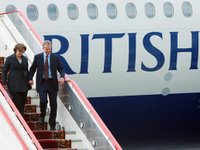 | President Bush Meets with British Prime Minister Blair - PRESIDENT BUSH: It's good to be here with my friend and our close ally. We just had a wide-ranging discussion: we talked about the Middle East, |
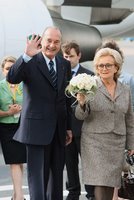 | Remarks by President Bush and French President Chirac - PRESIDENT BUSH: I want to thank Jacques Chirac for coming over. It's always a pleasure to visit with Jacques. He is a man who is able to crystalize his thoughts, who is able to discuss issues in a very clear way. Download High Resolution Image |
 | President Bush Meets with President Hu of China at the G-8 Summit - PRESIDENT BUSH: Mr. President, thank you for coming by to say hello. I remember fondly your visit to Washington, D.C., a very successful trip to our Nation's Capital and other parts of our country. I want to thank you for the discussion we've had today. Download High Resolution Image |
 | President Bush Meets with Prime Minister Prodi of Italy - PRESIDENT BUSH: I've enjoyed my visit with the Prime Minister, Romano. I've known him for a long time. This isn't the first time we have had discussions, and so therefore, the discussions today were very cordial. They reflect the important relationship that the United States shares with Italy. Download High Resolution Image |
President Bush and Russian President Putin Participate in Press Availability
Joint Statement by U.S. President George Bush and Russian Federation President V.V. Putin Announcing the Global Initiative to Combat Nuclear Terrorism
Fact Sheet: the Global Initiative to Combat Nuclear Terrorism
U.S.-Russia Foundation for Economic Advancement and Rule of Law
July 14, 2006President Participates in Roundtable Discussion with Civil Society in Russia
June 6, 2006President Bush to Attend 2006 Group of Eight (G-8) SummitMore News » -->
 | Official Website of the G8 - "This will be the first time that Russia will chair this respected international forum. |
Address by Russian President Vladimir Putin to visitors to the official site of Russia's G8 Presidency in 2006
G8 SUMMIT DOCUMENTS, July 16, 2006
1. Global Energy Security, 2. Education for Innovative Societies in the 21st century, 3. Fight against Infectious Diseases, 4. Trade, 5. Update on Africa, 6. Fighting High Level Corruption, 7. Combating IPR Piracy and Counterfeiting, 8. G8 Summit Declaration on Counter-Terrorism, 9. G8 Statement on Strengthening the UN's Counter-Terrorism Program, 10. G-8 Declaration on Cooperation and Future Action in Stabilization and Reconstruction, 11. Statement on Non-Proliferation, 12. Middle East
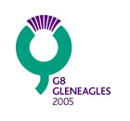 | RELATED: Keywords Gleneagles, Scotland, G-8, Tuesday, July 05, 2005 Bush Proposes New African Anti-Poverty Initiatives for G8,, |










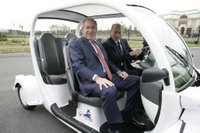
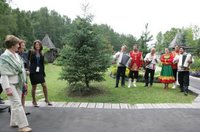


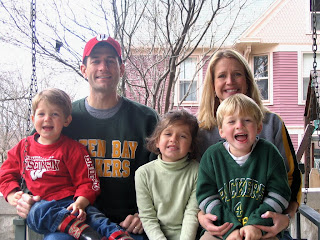

No comments:
Post a Comment